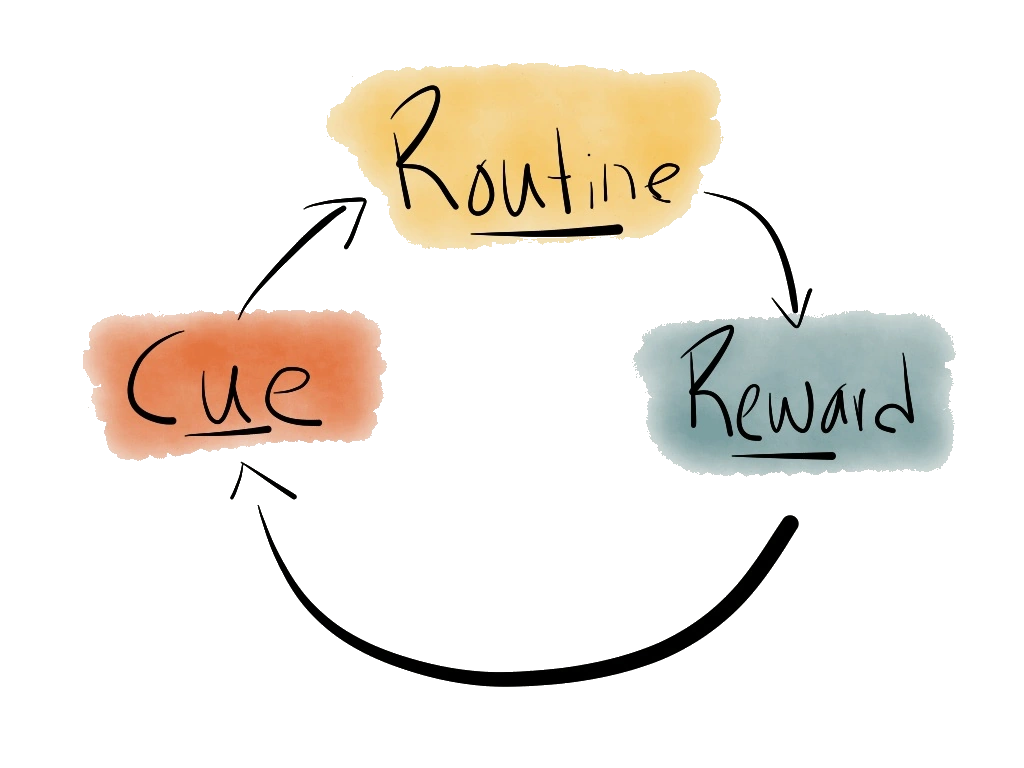Introduction to Concept:
In his book The Power of Habit, Charles Duhigg explains something advertisers have known for quite some time: human beings can be trained to respond to cues with routines as long as there is a reward. He calls this the habit loop. It looks like this:

The idea is that when we have a cue, we usually will follow a certain routine that leads to a reward and if this cue occurs enough times it becomes a habit and is very difficult to break. Many habits have no particular reward but are still hard to break. Think about things Americans do not eat (cartilage, fat, and animal skin) that are good for you and if you do not eat these things, think about how gross it feels to try eating them.
Duhigg’s model of habit formation is especially interesting Christians who wish to use spiritual disciplines, obtain some virtue, or overcome some particular sin.
Keep in mind this paragraph from Jesus’ brother:
Jas 1:13-15 ESV Let no one say when he is tempted, “I am being tempted by God,” for God cannot be tempted with evil, and he himself tempts no one. (14) But each person is tempted when he is lured and enticed by his own desire. (15) Then desire when it has conceived gives birth to sin, and sin
when it is fully grown brings forth death.
James’ answers the question, “Who is the go-to guy for blame when we sin?” Who is it? The person who sins. Or, to put it more
Personal Case Study
I have a tendency to struggle with acedia. It’s essentially a feeling of weird existential boredom that leads to sloth. The best cure for it,
- Cue: Feelings of lack of motivation coupled with a constant desire to know things.
- Routine: The internet now exists: follow links, listen to music, and read pointless articles.
- Reward: Dozens of silly facts rather in the same time it would take me to read one sustained argument concerning an important truth, perform one satisfying repair to part of my home, or write one chapter of a commentary on the Sermon on the Mount I am trying to finish by the end of the year.
Duhigg prescribes two paths to change the habit loop:
- Keep the cue and reward the same, but change the routine. To change the routine, Duhigg notes that we must come to understand precisely what craving is set off by the cue. For instance, a shopping addict might have the desire to accomplish something, but the routine (buying something on credit) is so easy that it is the only option that comes to mind until the loop is further examined by the obsessive clothing buyer.
- Remove the cue. Removing the cue only goes so far, but it is better than nothing. For instance, one would no longer be able to binge-watch The Office and eat sweets if they canceled their internet service and only bought meat, eggs, and veggies at the store.
Two Necessary Things to Keep in Mind
There remain two other elements to changing the habit loop:
- The role of belief
- The education of desire
As to the first idea, Duhigg observes that belief plays a crucial role in long term habit transformation (82-86). In the case of athletes, they have to believe that the new habits will help them succeed. Similarly, AA members who commit to the steps and the whole program are more successful when they actually believe in the higher power (84). In the case of Christianity there is a cluster of beliefs that are important for manipulating the moral habit loop:
- Sin really is disgusting and bad for you
- The way of Christ is meant to give you joy (often now, but infinitely so in eternity)
- You are dead to sin (in other words, it is not your master and you always have a way out)
- God will help you
The second element, the education of desire, is implied by Duhigg but made explicit in Scripture and ancient philosophy.[1] This should not be news to us. Many people grow to love the routine of exercise no matter how grueling, people start to enjoy the taste of healthy food on a new diet. For instance, I can only drink one or two types of soda now since I went about four years without a sip of the stuff. Soda, even a sip, burns my mouth and is so sweet that it makes my teeth hurt. If Christianity is true, it stands to reason that the process of habit formation applies to the moral life we see in Scripture as well. And we do see this.
Paul speaks of being transformed by the renewing of the mind. This implies that one can change for the better over time. Similarly, Peter speaks of growing in grace and knowledge. It is also the case that John and James speak of love and faith being perfected in us, respectively. The author of Hebrews says that we should strengthen our weakened joints in our quest for holiness and so-on (Hebrews 12:12). In other words, God shapes our desires through the habits we develop.
References
[1] In order to fully change our character, eventually our choices and then habits, must result in an incremental change of desire toward the good. Jesus talks about this difference of orientation in several places. For instance, he observes that the Pharisees do their religious rituals in order to hide their sin from others rather than as acts of faith, hope, and love toward God (which obeying the Law was always meant to be, see Psalm 19:7). So, when one begins to put to death sinful habits and to put holy habits into practice in their place out of sincere trust and hope in God, ones desires start to change.